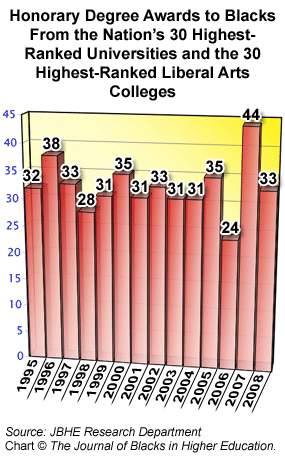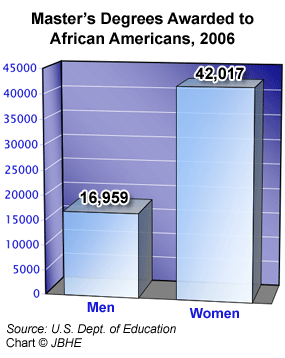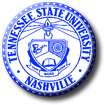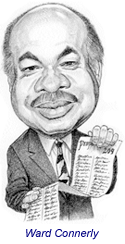Thirty-Three Blacks Receive Honorary Degrees at This Spring’s Commencement Ceremonies at Our Leading Universities and Colleges
In the spring of 2008, 21 honorary degrees were awarded to blacks from the nation’s 30 highest-ranked universities and another 12 were awarded by the 30 highest-ranked liberal arts colleges. Two years ago the number of honorary degree awards to blacks was the lowest in the 14 years of JBHE’s survey. Last year these universities gave out 44 honorary degrees, the most in the history of our survey. This year’s total has returned to a more average level.
Among the high-ranking universities, Harvard University, Dartmouth College, the University of Pennsylvania, Brown University, and the University of Notre Dame each gave honorary degrees to two blacks.
Among the leading liberal arts colleges, only Oberlin College awarded honorary degrees to two blacks.
This year music producer Quincy Jones was the only African American who received honorary degrees from more than one high-ranking educational institution.

Black Women Hold a Huge Advantage Over Black Men in Master’s Degree Awards
New data from the U.S. Department of Education shows that black women maintain a large lead over black men in the attainment of master’s degrees. In the 2005-06 academic year, black women earned 42,017 master’s degrees compared to 16,959 for black men. Thus, black women accounted for 71 percent of all master’s degrees awarded to African Americans.


WILLIAMS COLLEGE

Tenure Track Position in Mathematics
The Williams College Department of Mathematics and Statistics invites applications for one tenure track position in mathematics, beginning fall 2009, at the rank of assistant professor (in an exceptional case, a more advanced appointment may be considered). We are seeking a highly qualified candidate who has demonstrated excellence in teaching and research, and who will have a Ph.D. by the time of appointment.
Williams College is a private, coeducational, residential, highly selective liberal arts college with an undergraduate enrollment of approximately 2,000 students. The teaching load is two courses per 12-week semester and a winter term course every other January. In addition to excellence in teaching, an active and successful research program is expected.
Applicants are asked to supply a vita and have three letters of recommendation on teaching and research sent. Teaching and research statements are also welcome. Applications may be made on-line (http://www.mathjobs.org/jobs). Alternately, application materials and letters of recommendations may be sent to Olga R. Beaver, Chair of the Hiring Committee, Department of Mathematics and Statistics, Williams College, Williamstown, MA 01267. Evaluation of applications will begin on or after November 15 and will continue until the position is filled. For more information on the Department of Mathematics and Statistics, please visit http://www.williams.edu/Mathematics.
Williams College is committed to building and supporting a diverse population of faculty, staff and students, to fostering a varied and inclusive curriculum, and to providing a welcoming intellectual environment for all. As an EEO/AA employer, Williams encourages applications from all backgrounds. To learn more about Williams College, please visit http://www.williams.edu.

Law School at North Carolina Central University to Host the Chief Justice
 Students at the historically black law school at North Carolina Central University in Durham will have to be well prepared for next spring’s moot court competition. The judge presiding over the final competition will be John Roberts, chief justice of the United States. Students at the historically black law school at North Carolina Central University in Durham will have to be well prepared for next spring’s moot court competition. The judge presiding over the final competition will be John Roberts, chief justice of the United States.
Raymond Pierce, dean of the law school, met the chief justice at a judicial conference and Roberts offered to officiate at the moot court proceedings.
It will be the first time a current member of the U.S. Supreme Court has made an appearance on the campus of the law school. There are about 600 students at the law school, about one half of them are African Americans.
  |
65.6% Percentage of whites ages 25 to 29 in 2007 who had completed at least some college-level coursework.
50.0% Percentage of African Americans ages 25 to 29 in 2007 who had completed at least some college-level coursework.
source: U.S. Department of Education
|
Historically Black Delaware State University Offers Four New Graduate Degree Programs
 Delaware State University, the historically black educational institution in Dover, has announced that it will offer three new doctoral programs in the 2008-09 academic year. New doctoral programs will be offered in applied chemistry, neuroscience, and optics. A new master’s degree program in applied optics will be offered for the first time. Delaware State University, the historically black educational institution in Dover, has announced that it will offer three new doctoral programs in the 2008-09 academic year. New doctoral programs will be offered in applied chemistry, neuroscience, and optics. A new master’s degree program in applied optics will be offered for the first time.
With the four new offerings, Delaware State will now have 22 graduate degree programs.
Diverse U Celebrates Its 100th Birthday
 Recently the Newark campus of Rutgers University held a gala reception to honor the founding of the university 100 years ago. In its early days, the Newark campus of New Jersey’s flagship state university educated the children of European immigrants who worked in the city’s factories. Recently the Newark campus of Rutgers University held a gala reception to honor the founding of the university 100 years ago. In its early days, the Newark campus of New Jersey’s flagship state university educated the children of European immigrants who worked in the city’s factories.
Now Rutgers-Newark is one of the most diverse college campuses in the United States. There are about 10,000 students enrolled, 6,500 of whom are undergraduates. Blacks make up 19 percent of the enrollments at the Newark campus. Hispanics are 19 percent of the student body and Asians make up 24 percent of all undergraduate students. Whites are the largest ethnic group but they are only 29 percent of the student body.
Blacks Are Missing Out on Much of the More Than $1.6 Billion in Merit-Based Aid Given Out by State Governments
Blacks, who are three times as likely to be poor as whites, disproportionately benefit when need-based aid for college students is directed to youngsters in low-income families. But blacks, who on average have significantly lower grade point averages and scores on standardized tests for college admission than whites, receive almost insignificant portions of merit-based aid.
More than two decades ago, in 1986, more than 86 percent of all federal financial aid for college students was based on need. Today, less than 60 percent of all federal financial aid for students is based solely on need.
 The trend away from financial aid based on need that is so harmful to college-bound blacks is now developing at the state level. According to a new report issued by the National Association for State Student Grants and Aid Programs, 63 percent of all financial aid for college and graduate students awarded by state governments nationwide is need based. The trend away from financial aid based on need that is so harmful to college-bound blacks is now developing at the state level. According to a new report issued by the National Association for State Student Grants and Aid Programs, 63 percent of all financial aid for college and graduate students awarded by state governments nationwide is need based.
In state-based financial assistance, the trend in recent years increasingly has been toward more merit-based aid. From 1999 to 2007, the percentage of all state grants that was need based dropped from 81 percent to 63 percent. About 22 percent of all need-based grants given by state governments also have a merit component where only high-performing, low-income students are eligible for the grants.
Overall, more than $1.6 billion in financial aid based solely on merit was awarded by state governments in 2007. This is triple the amount a decade ago. If this aid were redirected to needy students, the allocation could provide funds for an additional 150,000 or more financially pressed students to attend state-operated colleges and universities in the U.S.

UNIVERSITY OF NORTH TEXAS

Assistant Vice President for Student Development AND Dean of Students
The University of North Texas invites applications and nominations for the positions of Assistant Vice President for Student Development and Dean of Students. The University of North Texas is a student-centered public research university and the flagship of the UNT System. One of Texas' largest universities, UNT offers 99 bachelor's, 104 master's and 49 doctoral degree programs, many nationally and internationally recognized. UNT's more than 34,000 students.
The Assistant Vice President for Student Development in the Division of Student Development is responsible for oversight of the Center for Student Rights and Responsibilities, Student Legal Services, the Volunteer Center and Student Leadership programs. Candidates for the Assistant Vice President for Student Development will possess seven (7) years of progressively responsible administrative experience and a Doctorate in Student Personnel, Higher Education, or related field.
The Dean of Students prepares students to assume roles of leadership, involvement and service as productive citizens in a culturally diverse, technologically sophisticated society. Candidates for the Dean of Students will possess seven (7) years experience in post secondary education in positions of increasing administrative responsibility and a Doctorate (or completion within one year) in Higher Education, Counseling or closely related field. For more information on both positions, please go to https://jobs.unt.edu
UNT is an Affirmative Action/Equal Opportunity Employer

Benedict College Names Four New Trustees
 Benedict College, the historically black educational institution in Columbia, South Carolina, has named four new members to its board of trustees. The new members are: Benedict College, the historically black educational institution in Columbia, South Carolina, has named four new members to its board of trustees. The new members are:
• R. Jonathan Charleston, head of The Charleston Group;
• Kimberly Smith-Tann, president and CEO of Smith, Ozman & Joseph’s, a meeting management firm;
• Mary M. Kennemur, an entrepreneur and former Merrill Lynch executive; and
• Mayokun Aiyelokun, a senior at the college majoring in accounting.
Honors and Awards
 • LaHoma Smith Romocki, assistant professor of health education at North Carolina Central University in Durham, received the Franklin H. Williams Award for her service in the Peace Corps. • LaHoma Smith Romocki, assistant professor of health education at North Carolina Central University in Durham, received the Franklin H. Williams Award for her service in the Peace Corps.
Romocki holds a Ph.D. from the School of Journalism and Mass Communication at the University of North Carolina at Chapel Hill.
 • James H. Ammons, president of Florida A&M University in Tallahassee, received the Weathering the Storm Award from the Tampa Urban League. • James H. Ammons, president of Florida A&M University in Tallahassee, received the Weathering the Storm Award from the Tampa Urban League.
Grants
 • Tennessee State University, the historically black educational institution in Nashville, received a $2 million grant from the National Institutes of Health for research in the fields of biochemistry and cell biology. • Tennessee State University, the historically black educational institution in Nashville, received a $2 million grant from the National Institutes of Health for research in the fields of biochemistry and cell biology.
The university also received a $1 million grant from the U.S. Defense Department to support research in nanoscience and biotechnology.
|
A Record Number of Black Freshmen Expected at the University of Chicago This Fall
 Over the years the University of Chicago has been a laggard in enrolling African-American undergraduate students. In 2005 blacks were only 4.9 percent of the incoming class. But then new measures were put in place to increase the number of black students. An overnight recruiting effort for black students was launched during the fall semester. In addition, a new scholarship program for students in the Chicago public school system began to funnel a significant number of black students to the university. Over the years the University of Chicago has been a laggard in enrolling African-American undergraduate students. In 2005 blacks were only 4.9 percent of the incoming class. But then new measures were put in place to increase the number of black students. An overnight recruiting effort for black students was launched during the fall semester. In addition, a new scholarship program for students in the Chicago public school system began to funnel a significant number of black students to the university.
Now the University of Chicago reports that the undergraduate class entering this fall will be the most diverse in the university’s history. The university reports that the incoming class will have record numbers of African Americans, Hispanics, Asians, and international students. In addition, the percentage of students who come from low-income families will increase by 28 percent.
Preliminary data shows that there will be about 110 black first-year students in the Class of 2012 at the University of Chicago. In the class entering the university in the fall of 2007, there were 91 black students who comprised 6.8 percent of the incoming class. Since 2005 the number of black freshmen at the university has nearly doubled.
  |
“We have a hospitable environment here for minority students. They find a home here and they stay here. There’s an atmosphere of welcoming that you don’t find everywhere.”
— Sharron Ronco, associate provost at Florida Atlantic University in Boca Raton, commenting in the Palm Beach Post on the fact that the black student graduation rate at the university is actually higher than the rate for white students
|
JBHE Analysis Finds That Blacks Are About 5 Percent of the Membership of the American Academy of Arts and Letters
The American Academy of Arts and Letters is less well known than the American Academy of Arts and Sciences but considerably more exclusive. Membership is restricted to 250 individuals. Unlike the AAAS, where scholars from almost any field are eligible for membership, inductees into the AAAL must be a luminary in literature, art, or music. Current and past members include Allen Ginsberg, Stephen Sondheim, Susan Sontag, Mark Twain, William Faulkner, John Steinbeck, and Frank Lloyd Wright.

As is the case with the other honorary societies, there are no official statistics on the present racial makeup of the AAAL membership. However, independent analysis of the membership list by JBHE concluded that at the present time 12 of the 250 members, or 4.8 percent, are black. Thus, it appears that blacks are more proportionately represented in the AAAL than in the AAAS and many of the nation’s other prestigious honorary societies.
The 12 black members are:
T.J. Anderson |
Jamaica Kincaid |
Amiri Baraka |
Toni Morrison |
Ornette Coleman |
Albert Lee Murray |
Ernest J. Gaines |
Martin Puryear |
Henry Louis Gates Jr. |
George T. Walker |
Richard Hunt |
Olly Wilson |
A Champion of Increasing Black Higher Educational Opportunities in Georgia Has Announced Her Retirement
 Last month Dorothy L. Lord retired after serving 17 years as president of Coastal Georgia Community College in Brunswick. When Lord came to the predominantly white college in 1991 she was determined to increase the racial diversity of the campus. In 1993 she instituted the Minority Outreach Program which had the goal of increasing black male enrollments at the college. The program identifies at-risk seventh-grade black males in area schools who have academic or disciplinary problems. Students chosen for the intervention program are tutored and given training on how to reform their bad habits. Hundreds of young black males have gone through the program and have turned their lives around. Last month Dorothy L. Lord retired after serving 17 years as president of Coastal Georgia Community College in Brunswick. When Lord came to the predominantly white college in 1991 she was determined to increase the racial diversity of the campus. In 1993 she instituted the Minority Outreach Program which had the goal of increasing black male enrollments at the college. The program identifies at-risk seventh-grade black males in area schools who have academic or disciplinary problems. Students chosen for the intervention program are tutored and given training on how to reform their bad habits. Hundreds of young black males have gone through the program and have turned their lives around.
One byproduct of the program is that there are many more students who become eligible for enrollment in college once they complete high school. Black enrollments at Coastal Georgia Community College have surged. African Americans now make up 26 percent of the 3,000-member student body.
Brunswick mayor Bryan Thompson praised Lord for her work by saying, “Her outreach initiatives have changed the community as a whole. She has made going to college a real option for people who never would have considered it before.”
For her efforts, Dr. Lord was presented with the 2007 Leadership Award by the board of regents of the University System of Georgia.
University of South Carolina Receives the Political Papers of Ernest Hollings, a 1960s Segregationist Politician Who Later Sought Out Black Votes
 The University of South Carolina has announced the acquisition of the political papers of Ernest “Fritz” Hollings. Hollings’ political career spanned more than 50 years in the state legislature, the governor’s mansion, and the U.S. Senate until his retirement in 2005. Hollings unsuccessfully sought the Democratic nomination for president in 1984. The University of South Carolina has announced the acquisition of the political papers of Ernest “Fritz” Hollings. Hollings’ political career spanned more than 50 years in the state legislature, the governor’s mansion, and the U.S. Senate until his retirement in 2005. Hollings unsuccessfully sought the Democratic nomination for president in 1984.
The Hollings papers were housed in 2,400 large boxes. Library officials estimate that when the archiving process is complete, the papers will take up 1,000 linear feet of shelf space. The collection will be preserved and digitized into a searchable database.
Of particular interest to readers of JBHE will be whether any additional information on Hollings’ racism will be revealed in the archives. As governor in the early 1960s Hollings was an ardent segregationist who returned the Confederate flag to the top of the state capitol where it remained for nearly two decades. Hollings is known to have used racial slurs and made many disparaging remarks about black people.
As late as 1993, Hollings, then a U.S. senator from South Carolina, was discussing a trade conference he attended in Geneva, Switzerland. Commenting about the members of the African delegation to the conference, Hollings remarked, “You’d find these potentates from down in Africa, you know, rather than eating each other, they’d just come up and get a good square meal in Geneva.”
Blacks From Working-Class Families in Britain Are Far More Likely Than Working-Class Whites to Enroll in College
 A study by the United Kingdom’s Department for Innovation, Universities and Skills finds that white men from working-class families are far less likely to enroll in higher education in Britain than black or Asian youths. The study found that 18 percent of young black males from working-class families entered college by age 19. For Asians in Britain, 25.4 percent had enrolled in higher education. A study by the United Kingdom’s Department for Innovation, Universities and Skills finds that white men from working-class families are far less likely to enroll in higher education in Britain than black or Asian youths. The study found that 18 percent of young black males from working-class families entered college by age 19. For Asians in Britain, 25.4 percent had enrolled in higher education.
When gender differences are included, college enrollment rates between blacks and whites are even more pronounced. Most remarkably, the study found that white working-class men were more than eight times less likely to enroll in higher education than black women from working-class families.

UNIVERSITY OF MISSOURI-COLUMBIA

Assistant/Associate Professor in African American Gender Topics
The Women's and Gender Studies Department (WGST) at the University of Missouri-Columbia seeks a scholar whose primary research and teaching interests focus on African American and gender topics. This is a tenure track position beginning in August 2009. Requirements include an advanced A.B.D. or PhD, evidence of ability to conduct a program of research on African American gender issues, and commitment to teaching at the undergraduate and graduate levels.
Applicants should have research and teaching interests in one or more of the various intersections of race, ethnicity, region, culture, class, gender, age, sexuality, disabilities. The teaching load in the department is four courses per year. The department provides excellent research support, mentoring and offers an exciting intellectual environment.
The University of Missouri-Columbia is committed to increasing the diversity of the college community and curriculum. Candidates are encouraged to apply and to identify their relevant strengths and experiences, indicating these in the cover letter. We are interested in candidates who work in the intersections of African American Studies and Women's & Gender Studies.
To apply, submit a cover letter that includes a statement of your research, future research program and teaching interests or experience, a curriculum vitae, three letters of recommendation, and publication(s) or writing sample(s) to: Dr. Tola Olu Pearce, Chair of Search Committee, Women's and Gender Studies Department, 325 Strickland Hall, University of Missouri-Columbia, Columbia, Missouri. 65211.
The review of applicants will begin on November 1, 2008 and continue until the position is filled. Please direct questions to Dr Tola Pearce (pearcei@missouri.edu), Dr. Jacquelyn Litt (Littj@missouri.edu) Director of WGST, or Administrative Assistant Shelda Eggers at (573) 882-2703 or EggersS@missouri.edu. See our website: http://wgst.missouri.edu
The University of Missouri is an equal opportunity/Affirmative Action employer.

So Much for the Mismatch Theory
In 2005 Richard Sander of UCLA wrote an article in the Stanford Law Review, which claimed that black students were being admitted in large numbers to law schools where they could not compete with white students. Sander concluded that these affirmative action admissions programs actually led to a decrease in the number of black attorneys. His reasoning was that if black students were denied admission to the top schools, they would enroll at lower-tier law schools where they would be successful and go on to pass the bar.
In rebutting the Sander thesis, JBHE produced data showing that the black student graduation rate at many of the nation’s high-ranking law schools was 90 percent or more. Also, the black student graduation rate at these schools was in most cases equal to or very close to the graduation rate of white students.
 Now the right-wing Center for Equal Opportunity has obtained data showing that from 2003 to 2005, 45 percent of the black students admitted to George Mason University School of Law had grade point averages that placed them in “academic failure.” For other students at the law school, only 4 percent had such low grade point averages. Now the right-wing Center for Equal Opportunity has obtained data showing that from 2003 to 2005, 45 percent of the black students admitted to George Mason University School of Law had grade point averages that placed them in “academic failure.” For other students at the law school, only 4 percent had such low grade point averages.
But the Center for Equal Opportunity fails to disclose that the number of black students involved is so low that no statistically relevant conclusions can be drawn. In both 2004 and 2005 there were only seven black first-year students at the law school.
Also, the Center for Equal Opportunity has cherry-picked the years that best support its political agenda. The law school reports that since that time, 21 black first-year students have enrolled, 8 in 2006 and 13 last year. And only one of these 21 black students has failed academically. Therefore, more than 95 percent of the black students are succeeding at the law school.
It is unfortunate that the right wing, and sometimes racist organizations, indulge in statistical deception to advance an agenda to hold blacks in place.
It Appears That Initiatives to Ban Race-Sensitive Admissions at Public Universities Will Be on the Ballot in Three States This November
 Ward Connerly is the African-American entrepreneur who led the efforts to ban race-sensitive admissions at state-operated universities in California, Washington, and Michigan. Now Connerly’s organizations have submitted enough signatures to secure a place on the ballot this November for public referenda in Nebraska and Arizona that would ban race-sensitive admissions at public universities in those states. Ward Connerly is the African-American entrepreneur who led the efforts to ban race-sensitive admissions at state-operated universities in California, Washington, and Michigan. Now Connerly’s organizations have submitted enough signatures to secure a place on the ballot this November for public referenda in Nebraska and Arizona that would ban race-sensitive admissions at public universities in those states.
Connerly had previously submitted enough signatures to qualify for a similar referendum to gain ballot access in Colorado.
Efforts to get similar proposals on the ballot in Oklahoma and Missouri were unsuccessful.
Appointments
 • Thomas E.H. Conway Jr. was appointed vice chancellor at Fayetteville State University in North Carolina. He previously served as dean of undergraduate programs at North Carolina State University. • Thomas E.H. Conway Jr. was appointed vice chancellor at Fayetteville State University in North Carolina. He previously served as dean of undergraduate programs at North Carolina State University.
 • Ebonya L. Washington was named Henry Kohn Assistant Professor of Economics at Yale University. She has been a member of the faculty at Yale since 2004. • Ebonya L. Washington was named Henry Kohn Assistant Professor of Economics at Yale University. She has been a member of the faculty at Yale since 2004.
Dr. Washington is a graduate of Brown University. She holds a Ph.D. in economics from MIT.
 • Felicia L. Patterson was appointed vice president of learner support services at Anne Arundel Community College in Arnold, Maryland. She was executive vice president of student and enrollment services at the Community College of Denver. • Felicia L. Patterson was appointed vice president of learner support services at Anne Arundel Community College in Arnold, Maryland. She was executive vice president of student and enrollment services at the Community College of Denver.
Patterson is a graduate of Howard University. She holds a master’s degree from and is currently completing doctoral work at the University of Denver.
 • Harry Lee Williams was selected as the new provost at Delaware State University. Williams has been serving as interim senior associate vice president for academic and student affairs and interim associate vice president for academic affairs for the University of North Carolina system. • Harry Lee Williams was selected as the new provost at Delaware State University. Williams has been serving as interim senior associate vice president for academic and student affairs and interim associate vice president for academic affairs for the University of North Carolina system.
Dr. Williams holds bachelor’s and master’s degrees from Appalachian State University and a doctorate from East Tennessee State University.
 • Carol A. Blackshire-Belay was named provost and vice chancellor for academic affairs at Fayetteville State University. She was vice chancellor for academic affairs at Sonoma State University. • Carol A. Blackshire-Belay was named provost and vice chancellor for academic affairs at Fayetteville State University. She was vice chancellor for academic affairs at Sonoma State University.
• David Olah was named interim president of Barber-Scotia College in Concord, North Carolina. He joined the college last September as academic dean. He previously was superintendent of North Hills Christian School in Salisbury, North Carolina.
 • Darrell J. Davis was named assistant dean of student and multicultural affairs at the Hamline University School of Law in St. Paul, Minnesota. He has been a corporate attorney for the past 25 years. • Darrell J. Davis was named assistant dean of student and multicultural affairs at the Hamline University School of Law in St. Paul, Minnesota. He has been a corporate attorney for the past 25 years.
Davis is a graduate of the University of North Carolina at Chapel Hill. He holds a law degree from the University of Minnesota School of Law.
|
 .
.